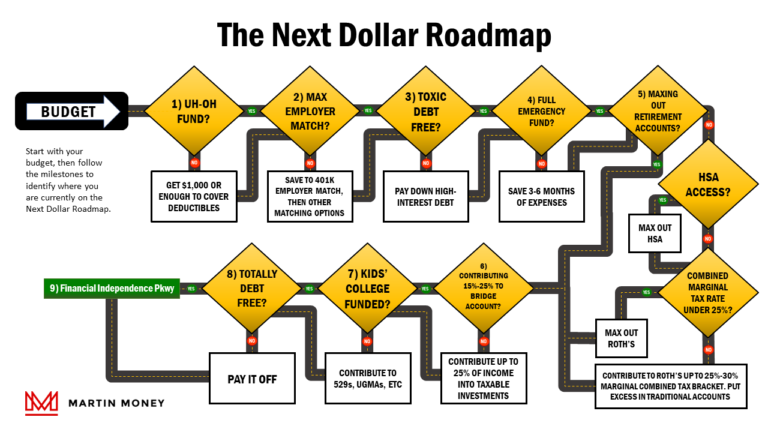How Much Money Should I Have in My HSA?
The amount of cash you hold in your HSA is dependent upon your strategy for the account. If you plan to spend your HSA money as medical expenses are incurred, you should keep enough to cover your deductibles. If you plan to invest the money for the long haul, you will want to leave the HSA funds untouched as long as possible.
Now that’s a good question.
I guess the easiest answer is as much as you can, but that’s also probably not very helpful.
As usual, the best answer depends on a number of factors.
For millions of Americans, a Health Savings Account serves as a clearing account for medical expenses only.
Used this way, the HSA is funded up to or just above a person or family’s expected level of medical expense for a given year. Then, the funds are spent as needed and replenished.
This allows the account holders to harvest the tax-free benefits that HSAs provide for contributions and withdrawals but stops short of providing a tax-free option for investment growth.
If you’re in the 7% of HSA owners who also invest your contributions, it doesn’t matter how much is in the account as much as how much is invested versus what is available for medical expenses.
In this post, we’ll cover a few scenarios and address the pros and cons of each so you can better relate each one to your own situation.
I also want to point out that we’re going to be talking about how much money to hold in your HSA, not how much you should be contributing. We’ll address contributions in another post.
HSA Characteristics
Before we jump into the 3 scenarios, let’s revisit some of the more pertinent characteristics of Health Savings Accounts.
To begin with, HSA contributions, earnings, and withdrawals are all completely tax-free as long as the money is used for a qualified medical expense.
To be eligible to contribute to an HSA, covered persons must be enrolled in a high-deductible health plan (HDHP).
HDHPs typically have much lower premiums than PPOs, but those insured under the policy will face higher deductible costs if they seek medical services.
If you’re medical costs are predictable or low, the benefits of HSAs are hard to beat.
HSAs also allow their account owners to invest the funds, meaning their potential for growth rivals that of any other tax-advantaged saving vehicle.
Any funds not used for medical expenses can be withdrawn beginning at age 65 but are subject to regular income taxes.
Finally, for this post, it will be important to note that there is no expiration on reimbursement for qualified medical expenses. One could seek reimbursement years and years after the actual expense is incurred.
Consideration 1: How Predictable Are Your Medical Expenses?
The most challenging aspect of optimizing your HSA is not knowing what your future medical costs will be.
If you have poor health, and experience high annual healthcare costs, but elect to use an HSA anyway, then at the very least I’d save up to the maximum out-of-pocket for your plan.
The reason should be obvious.
You’re likely to spend the money anyway, so why not channel as much of it through a tax-free space as possible?
You might ask yourself, “Why would anyone with high medical costs sign up for a high-deductible health plan?”
The answer depends on their individual circumstances, but sometimes a PPO isn’t an option or not a very advantageous one.
Another consideration is the ability HSAs provide to invest for future medical expenses.
If one expects long-term high medical costs, no other savings vehicle can provide a tax-free place to build a nest egg focused on medical care.
There are many ways to approach paying for future medical costs. The strategies are as individual as most others in personal finance.
If you are in good health, then I’d suggest looking back at the last several years and find out what your average annual out-of-pocket costs have been. Most insurance companies should have this on record for you to review.
If you can’t locate this information, then estimate as well as you can.
Once you have this amount, consider keeping at least this much in cash in your account, plus a little for inflation. You may also think about keeping an amount equal to that spent in your personal highest-cost year for medical expenses.
If you are more conservative and wish to further mitigate risk, keep up to your maximum deductible and/or out-of-pocket amounts in cash or cash equivalents within your HSA.
Finally, if you have a year upcoming when you know you will experience higher medical costs, you could always dump the HDHP for a year and sign up for a PPO with a higher premium during open enrollment.
Some predictable expenses could include having a baby or an elective procedure that you can schedule.
There’s nothing wrong with taking advantage of your annual open enrollment and engaging in a little “medical arbitrage” to defer as much cost as possible.
In summary, you should hold enough to cover 1) your average annual medical costs, 2) your maximum annual deductibles, or 3) your maximum annual out-of-pocket expenses; depending on how risk-averse you are.
Remember you can also use your emergency fund to cover anything that runs over the cash you have in your HSA, though it won’t come on a tax-free basis.
Consideration 2: How Are You Using the HSA?
In our introduction, we pointed out that the vast majority of HSA owners use the account as a sort of emergency fund for medical expenses.
The idea is to put enough cash in the account to cover expected medical expenses, or perhaps enough to cover deductibles in the case of an unforeseen treatment and refrain from making further contributions unless an expense occurs and the account needs to be replenished.
With this approach, one can cover medical costs with tax-free money, but not have to divert any more than necessary to do that.
We covered this in greater detail in the previous section.
But what if you’re a part of the minority who’s investing your HSA funds? Should this change your approach?
We’ll discuss how much of your invested assets should be left in cash in the next section.
Obviously, if you are investing your HSA funds you have a goal to increase the size of the HSA over time.
In this case, it makes sense to put as much into your HSA annually as you can afford.
One way to do this is to take advantage of any option you have to fund the HSA through payroll deduction (from your employer plan only).
In this case, you’ll not only avoid income taxes, but also Social Security, Medicare, and unemployment insurance, saving you more than another 7.65% on each deposit.
You should also take advantage of any employer contributions through direct matching or a rewards program where contributions are made by your employer by healthy choices you make.
This is free money just like an employer contribution to a 401(k). It’s a no-brainer to take it if it’s available.
Consideration 3: When Do You Plan to Pay From the HSA?
If you are using your HSA as a clearing account, then you’ll be spending down your balance as expenses are incurred. In this case, hold enough to cover your annual costs, deductibles, or out-of-pocket costs as we described in section one.
If you are investing your HSA contributions in securities available through your plan sponsor, then you’ll deposit as much as you can into the account as we said in section two.
However, there are two key ways people pay for medical expenses while also trying to grow their account balances as much as possible.
The first group holds a portion of the portfolio in cash to cover current medical expenses and invests the rest.
The second group pays for their medical expenses out of other accounts (like an emergency fund) and saves the receipts for these costs in order to be reimbursed at a later date.
The reason this second group waits to pull their money out of the account is because they want to leave the assets alone to grow.
You see, you get an annual contribution maximum for your HSA and it cannot be increased to offset expenses in a given year.
In other words, once you remove money from an HSA, it cannot be replaced. This means the longer the funds stay in the account, the more time they have to grow tax-free.
By leaving the balance alone, this group maximizes the long-term growth of their HSA.
If you’re in the first group, it would be wise to keep some portion of your balance in cash. Again, up to the amount of your average annual costs, deductibles, or out-of-pocket expenses, depending on how conservative you are.
In the second group, you should invest as much of your balance as your plan allows, according to your chosen asset allocation. (Most custodians require that at least some portion of the account be held in cash.)
However, if you’re in this second camp, be sure you have adequate funds in your fully funded emergency fund to pay your current costs out of pocket. You can then seek reimbursement whenever it is convenient for you.
What The Martin’s Do
Personally, we keep about $3,000 liquid in our HSA which covers the annual deductible for our family.
Our maximum annual out-of-pocket is $6,000 for in-network services ($15k out-of-network), which we would only reach in the event of a major medical event (God forbid).
Should the worst happen, we would either sell investments in the HSA to cover those costs (if the investment values were high) or tap emergency funds and seek reimbursement later when the value of the investments in the HSA is suitable for a sale.
This way we don’t have to keep very much of our HSA in cash, but still have the ability to pay for a medical emergency from liquid assets. The emergency fund gives us this flexibility.
We have a little over $20k in our HSA which has largely been funded by my employer over the years. We started maxing out our HSA contributions just a couple of years ago and will likely continue to do so until we retire (and maybe after if there’s a way to do that).
We pay for all of our medical expenses from the HSA when they occur.
This is not as optimal as paying for those expenses out of our emergency fund and obtaining reimbursement later, but truthfully, I don’t want to have to keep track of the receipts, nor do I want to track down what we have and haven’t been reimbursed for.
To each, his own.
In retirement, we will use our HSA for whatever Medicare costs we can. We will also try to spend the balance down completely before we die because we’d rather leave other assets to our heirs.
If a large balance remains, we may elect to donate it to charity if that’s part of our estate plan.
Of course, if our health situation changes, we could move away from an HDHP meaning we would not be able to contribute to an HSA. We’ll just have to wait and see.
Like many things, our HSA strategy is fluid and needs to be reviewed on an annual basis.
Conclusion
If you’re using an HSA, I’d err on the side of having too much cash in the account.
The flexibility to remove assets after you turn 65 means you shouldn’t fear over-funding the account.
After all, medical costs are high and only getting more expensive. You’ll probably need quite a stash to cover it all before you die.







